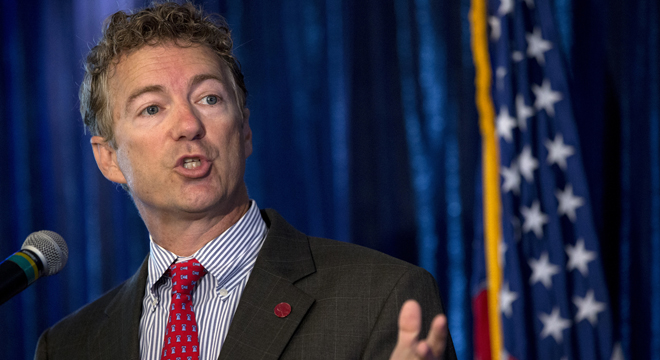The United States will reach its federal debt ceiling in T-minus 10 days, and it’s looking increasingly plausible that we might blow through it.
Economists of every stripe agree that a U.S. default would be economically catastrophic. But there is a subsection of Republicans — present in past debt limit debates and reappearing over the last few weeks — who say that hitting the ceiling isn’t a big deal. They aren’t just making these pronouncements to reporters, though: according to Roll Call, Sen. Patrick Toomey (R-PA) told Treasury Secretary Jack Lew in a closed-door meeting that he could avoid default even if the debt limit is breached.
Here are eight other GOPers who have made their position public:
Sen. Rand Paul (R-KY), Oct. 2 on CNN
“If you don’t raise the debt ceiling, what that means is you have a balanced budget. It doesn’t mean you wouldn’t pay your bills. We should pay the interest and we should never scare the markets. So, if I were in-charge, I would say, absolutely, we will never default. I would pass a law saying that the first revenue every month, the first revenue, has to go to pay interest.”
Rep. Justin Amash (R-MI), Oct. 6 in National Journal
“There’s always revenue coming into the Treasury, certainly enough revenue to pay interest. Democrats have a different definition of ‘default’ than what we understand it to be. What I hear from them is, ‘If you’re not paying everything on time that’s a default.’ And that’s not the traditionally understood definition.”
Rep. Mick Mulvaney (R-SC), Oct. 6 in National Journal
“We’re not going to default; there is no default. There’s an [Office of Management and Budget] directive from the 1980s, the last time we got fairly close to not raising the debt ceiling, that clearly lays out the process by which the Treasury secretary prioritizes interest payments. Tim Geithner understood that, because the last weekend in July of 2011 he was in New York City telling the primary dealers that we were not going to default on our debt.”
“If the president wants to lie to the public, I can’t stop him.”
Rep. Joe Barton (R-TX), Oct. 7 on CNBC
“We have in my household budget some bills that have to be paid and some bills that are only paid partially. I think paying interest on the debt has to be paid. I think paying Social Security payments have to be paid. I don’t think paying the secretary of energy’s travel expenses have to be paid 100 cents on the dollar.”
Rep. Steve King (R-IA), Oct. 3 on CNN
“I don’t think the credit of the United States is going to be collapsed. I think that all this talk about a default has been a lot of demagoguery, a lot of false demagoguery.”
Rep. Ted Yoho (R-FL), Oct. 7 in the Washington Post
“I think we need to have that moment where we realize [we’re] going broke. I think, personally, it would bring stability to the world markets.”
Sen. Mike Crapo (R-ID), Sept. 23 in PolicyMic
“Well, in the short term, first of all, I think that any such default would be short because I don’t think either party would allow that to last. I don’t think it’ll happen, but if it did it would be very short… It all depends on what it generated. If it generates some real progress toward entitlement reform and getting tax reform teed up for activity, then I think that’s one of the best things that could happen for young people.”
“On the other hand, if it simply in the short term generated government defaults, that’s gonna be harmful. So it’s kind of a long-term versus short-term view.”
Sen. Tom Coburn (R-OK), Oct. 7 on CBS
“Look, the debt ceiling and the [continuing resolution] are the same thing. There is no such thing as a debt ceiling in this country because it’s never been not increased and that’s why we’re $17 trillion in debt.”
“And I would dispel the rumor that’s going around that you hear on every newscast that if we don’t raise the debt ceiling, we’ll default on our debt. We won’t. We’ll continue to pay our interest, we’ll continue to redeem bonds and we’ll issue new bonds to replace those. So it’s not entirely accurate.”






